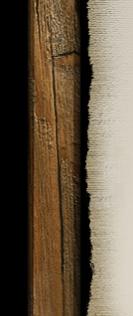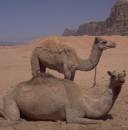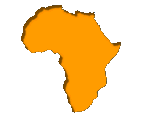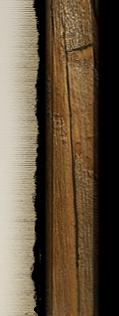
 |

|
| STATS |
| Order |
Artiodactyla |
| Family |
Camelidae |
| Genus |
Camelus |
| Species |
Dromedarius |
|
|
| Height |
190-230 cms |
| Weight |
450-650 kgs |
| Lifespan |
40 years |
| Habitat |
Deserts |
|

|
|
|
The Arabian Camel (camelus dromedarious) which comes from North Africa, is one of the six species in the Camelidae family, along with the Bactrian Camel (Camelus bactrianus), Llama, Alpaca, Guanaco and Vicuna.
Camels have very long eyelashes which protect their eyes from the sand, and they can also close their nostrils to stop them from breathing in the sand. Their humps are made up of a fatty tissue which the camels draw energy from.
The Arabian Camel (also called the Dromedary) has only one hump and comes from North Africa. They are adapted to the desert and have thick pads to protect them from the hot sand.
|
Camels can run upto 20 miles per hour
They only start to perspire at a body temprature of 40.5 degrees celsius thus conserving body fluids
Camels have 34 teeth
They can drink 100 litres of water in one sitting
|

|
| BOOKS
ON CAMELS |
 |
| |
|
|
Camels
|
|
Author: R.Trevor Wilson |
This text is designed to provide a background to the biology and ecology of camels, in order to enable workers involved with them to increase camel production. Included are chapters on different types and breeds, physiology, and uses of the camel, in particular transport and milk production.
|
|
|
Buy
|
|
|
The Lost Camels of Tartary
|
|
Author: John Hare |
The author recounts his adventures on three expeditions to the Mongolian and Chinese Gobi deserts, the first in 1993 with Russian scientists, the second and third with Chinese scientists in 1995 and 1996. Their aim was to track down the wild Bactrian camel, of which there are only 1000 left.
|
|
|
Buy
|
|
|
Copyright 2010 © Safaripark.co.uk - All rights reserved
|
|
|

Hosted by recMedia
|
|
Visit www.castlewales.com for Castles in Wales
|
|

 |
|
|




